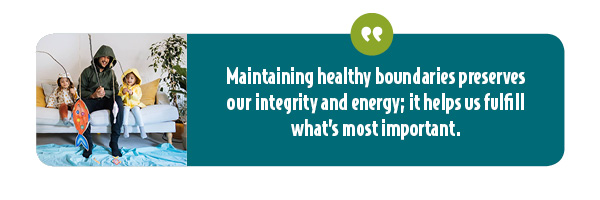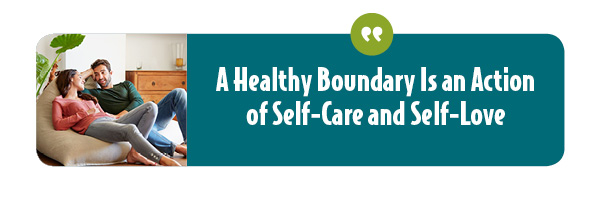Do you have a hard time setting boundaries in your relationships? Are you constantly putting other people's needs before your own? If this sounds like you, don't worry, you're not alone. It's not just people-pleasers who have a difficult time setting healthy boundaries. Setting boundaries in relationships can be tricky, especially if you’re easy-going, kind, and struggle to say no.
Estimated reading time: 10 minutes
 Unhealthy Boundaries Versus Healthy Boundaries
Unhealthy Boundaries Versus Healthy Boundaries
One of the reasons people have difficulty setting boundaries is because they think of them as barriers, tools for pushing others away. But boundaries aren't about shutting people out. They're about defining your limits to be at your best. When you have healthy boundaries, you can take better care of yourself and your relationships.
When we have poor boundaries, our needs are secondary to others' needs and stunt personal growth.
Unhealthy boundaries are everywhere you look. Here are some examples:
- A co-worker who tolerates distracting chatter, disrespect, or gossip by another employee.
- Friends or family members who drop by for an announced visit even after you've told them you prefer a phone call before they stop.
- People-pleasers (those who give and give and give), like a mother who puts everyone else's needs before her own without sufficient self-care.
- Teens who go along with their peers to avoid conflict to be liked, even when it can be life-threatening.
- A spouse who ignores their partner while perusing social media on their smartphone; their partner may be sad but they allow it.
You get the idea. So many situations require boundaries.
 Reasons We Don't Set Boundaries
Reasons We Don't Set Boundaries
There are some common reasons why people neglect to set healthy boundaries. Let’s look at some typical motivations:
- A desire to be liked and accepted
- Avoid rejection and negative reactions
- Fear of reprisal
- Avoidance of conflict
- The need to belong
- Fear of letting someone down
- Social conditioning
- To prove ourselves worthy of love
These are the most frequent reasons for not setting boundaries. However, every person is unique with varying influences. For example, we could have experienced trauma growing up that might cause boundary-setting to feel threatening. But regardless of our reasons to over-give or tolerate negative behaviors in ourselves or others, life is second-rate without limits and boundaries.
When we are more self-aware of what motivates us, our awareness provides a sharpening for building skills more effectively.
So, how motivated are you to create a life you love?
Related reading: “Create a Healthy and Happy Life with Effective Boundaries”
Healthy Boundaries Preserve a Healthy Life
Boundaries are about creating healthy, meaningful relationships in which both parties feel heard and respected.
Healthy boundaries allow for positive growth in yourself, others, and your relationships. If you want healthy friendships and relationships, it's important to set healthy boundaries with everyone in your life—even those closest to you.
Setting healthy boundaries means learning to say no when a request or opportunity doesn't feel right to you. It means making sure that other people don't put demands on your time and energy that you aren't comfortable with. It also means sometimes agreeing but putting limits on the amount of time committed. When we set limits, we make time for the things that matter most.
The opposite is true as well—with unhealthy boundaries, many times, someone feels resentment and used. However, setting healthy boundaries doesn't mean disregarding the needs of others either.
When healthy boundaries are in place, people in the relationship generally feel loved and cared for.
 Create Thriving Relationships by Loving Yourself First
Create Thriving Relationships by Loving Yourself First
So, where do you begin? When establishing healthy boundaries with others, it's essential to start with yourself.
Start with raising your self-awareness. Ask yourself questions to discover the quality of your relationship with yourself and the areas needing attention. Learn how to take better care of yourself before asserting yourself in other relationships.
- Where are you unhappy? Do you over-give or overwork?
- What are your forgotten passions or hobbies that you haven’t made time for?
- When do you feel the happiest? What is different?
- Do you feel guilty when you aren't giving or serving others?
- What relationship or area of your life do you most need better boundaries?
It's difficult to set boundaries with other people if you don't have healthy boundaries with yourself. Begin by exercising limits in varying situations. Here are some examples:
- Refrain from a dessert when you want to lose weight.
- Complete a project that has been nagging at you.
- Get up a half-hour earlier to exercise or meditate.
- Choose a healthy lunch instead of fast food.
- Calm your emotions before lashing out at your kids or spouse.
- Replacing a negative, reoccurring thought with a more encouraging one.
Every time we set a functional boundary for ourselves or use self-control, we are practicing limits that are the same muscles we'll need when setting relational boundaries.
 Begin by making sure that you're putting your own needs first and at least equal to everyone else's whether it be family, friends, or co-workers. When you have momentum in personal decisions that are less threatening than saying no to a friend, you're ready to leap!
Begin by making sure that you're putting your own needs first and at least equal to everyone else's whether it be family, friends, or co-workers. When you have momentum in personal decisions that are less threatening than saying no to a friend, you're ready to leap!
Once healthy boundaries have been set for yourself, the next step is to extend healthy boundaries in your relationships.
Our Healthy Boundaries, Happy Life mini-course can help.
Let's begin with friendships. For friendships to thrive, they need nurturance and reciprocation. The give and take in the relationship flows: sometimes they initiate time together, and sometimes you do. You show up for them when they need help, and they reciprocate when you ask for a helping hand. You don't want to set healthy boundaries with friends only when the relationship feels uncomfortable.
Setting healthy boundaries isn't always easy — they require courage and practice. But once you get started with healthy boundary-setting in one relationship (or even on a small scale), you'll feel like a weight has been lifted off your shoulders, and you might even wonder why you didn't start sooner.
This new way of being means saying no when someone asks for a favor that will take up too much of your time or detracts you from present commitments. Or the request steals from an important goal you want to accomplish. It also means saying yes only when it feels right to you, NOT because someone needs you.

The best thing about setting healthy boundaries with friends is that it benefits everyone involved. It allows both parties to create a more functional friendship where no one feels used or suffocated by each other's whims or demands.
Another example of a possible need for a boundary is a friend asking to borrow money from you. Offering endless loans--even small ones -- can make you feel resentful, especially if the friend doesn't repay you. Often we don’t say no to a friend because we’re afraid their feelings will get hurt, or they’ll get upset, or it will jeopardize the friendship.
However, setting healthy boundaries with friends or family helps create mutual respect instead.
Yet, even if a friend is displeased that you won't lend money, be comforted if it's right for you, it's right for them. Find a healthy balance between self-care and nurturing your friendship. Your mental health and emotional well-being depend on it!
Let this person know that you’re capable of healthy boundary setting, particularly if their requests affect your health and happiness.
Related reading; "Do You Want a Happy Relationship? Develop Healthy Boundaries."
How to Set Healthy Boundaries Effectively
There are several steps to healthy boundary setting in any relationship:
1) Define what you need and want clearly.
2) Decides to set the boundary.
3) Set the boundary respectfully.
4) Allow the other person time to process the boundary you’ve set.
5) Stick to the boundary when necessary, which might include removing yourself from certain people's company if they don't respect your boundaries.
Sometimes setting healthy boundaries with friends can feel intimidating because your relationship is solidly established with patterns in place. But it’s vital that both people are happy and content with the friendship, not just one person.
When healthy boundaries are set lovingly, most of the time, the person will respond positively after self-reflection and recognize that your request or limit is legitimate It's up to the other person to take responsibility for their own happiness and fulfillment.
Remember that healthy boundary setting is a form of self-care and self-love— so allow yourself room for sadness or disappointment if a friend, partner, or co-worker reacts. Setting limits for behavior is a good thing! We have a right to what we need and want, regardless of whether others are unhappy about our choices.
When we don't set boundaries, sometimes we resent the person, which detracts from the quality of our relationship anyway. Or sometimes we push people away, i.e., not returning phone calls, making excuses we don't feel good when invited out, or pulling back from time together. These behaviors are setting a boundary indirectly. Without letting others know what's up, there is a blind spot in the relationship. We're also denying them the opportunity to change for the better and for the relationship to get stronger.
Whether you've been friends forever or just met, healthy boundaries with friends require honesty and trust to flourish.
Family relationships are another sensitive area where healthy boundaries are needed. Why is it easier to set healthy boundaries with strangers than with family members? You may have spent years calling your mom or dad every week. Then one day, as an adult child, you feel like it's too much to call every week. You decide to call less and focus on yourself and your goals. Or perhaps you’ve gone out partying weekly with a sibling or a cousin. Now you want to develop more emotional intelligence and healthy habits but they’re still wanting to party.

So how do you go about setting boundaries?
It's not always easy when you're disrupting a long-term pattern so start small. Starting with small steps makes success more likely. When we begin with minor adjustments, learning a new skill feels more approachable.
Begin discussing your goals with your family member and talk about the changes you want to make. Then, let your parents know you're going to call less frequently; call when you feel inspired to do so. Let your sibling know that you don't want to go out every week but you're willing to join them occasionally when it works for you.
With a bit of determination and a shot of courage, you can start to create the healthy limits you need in your life. It takes practice and patience to feel confident in setting boundaries, but in the end, you will be happier for it! It's imperative to create healthy, reciprocating relationships to live at our best.
Related reading: “How to Set Healthy Boundaries.”
Boundaries can be difficult to set, but they are worth practicing until you master them. If you’ve found that your boundaries need a little work or if you never learned how to establish healthy boundaries in the first place, then our Boundary Mini-Course is for you! You don't need any prior knowledge—just an open mind ready to learn new skills that could change your life forever!
(If you're interested in a deeper dive into mastering boundaries in your relationships and family, try out our online course on Boundaries.)
And if you’d like coaching support tailored just for you, we offer one-on-one coaching sessions. Get help from an expert who specializes in setting healthy boundaries and understands the ins and outs of communicating boundaries. Email support@heartmanity.com.
If you enjoyed this blog, don't miss out! Sign up for our newsletter.









